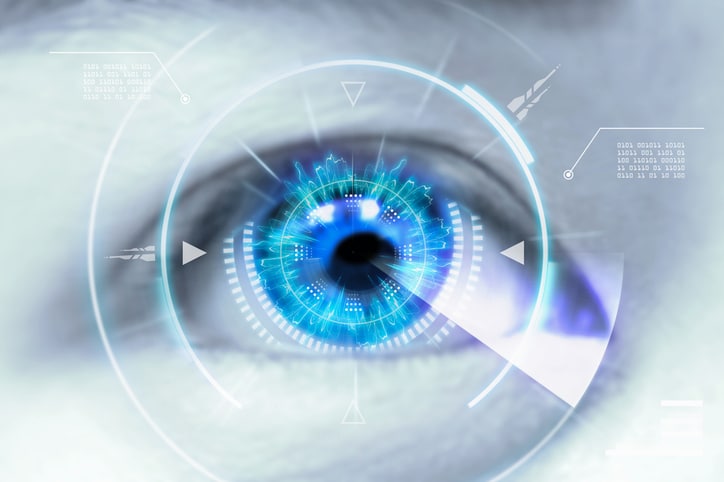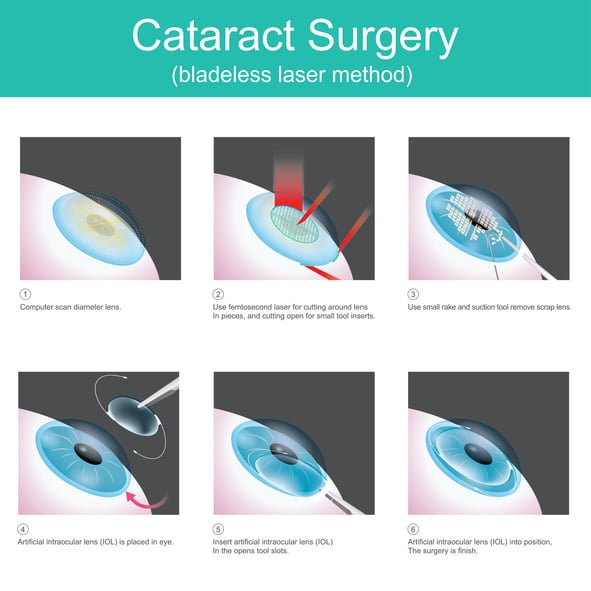Why Choose Us For Laser Cataract Surgery
Technology in ophthalmology is always advancing, and we make it a priority to stay ahead. Our office is equipped with the latest tools and innovations, including laser-assisted cataract surgery, to provide procedures that are safer and more effective.
Dr. Jani is a highly respected ophthalmologist with fellowship training in laser vision correction. He specializes in custom cataract surgery, laser vision correction, and other advanced eye procedures. Our patients benefit from treatments designed to meet modern standards—not outdated methods.
We believe that investing in technology means investing in your vision and your future!
Cataract surgery is among the safest and most successful procedures performed today. Millions of patients have regained clear, crisp vision thanks to this surgery and advanced intraocular lens (IOL) technology.
As a leading ophthalmologist serving Fredericksburg, Culpeper, and surrounding areas, Dr. Binoy R. Jani stays at the forefront of technological and surgical advancements. By incorporating femtosecond laser technology, your surgeon can enhance the safety, precision, and predictability of cataract surgery.

Table of Contents

About Femto Laser-Assisted Cataract Surgery
Like traditional cataract surgery, laser-assisted cataract surgery is performed with the goal of removing the cataract clouded lens and replacing it with an artificial intraocular lens (IOL). Unlike traditional cataract surgery, laser-assisted surgery is less dependent on handheld instruments to perform key steps in the cataract removal process. Instead, this method utilizes bladeless, computer-controlled precision to achieve enhanced results.
To begin, a detailed map of the eye will be created using advanced technology called optical coherence tomography (OCT). The map is used to guide the femtosecond laser when creating small, precise incisions on the natural lens and a centered circular opening in the lens capsule. The next step is to remove the cataract. Traditional cataract surgery uses ultrasound energy to break up the cataract diseased lens. In laser-assisted cataract surgery, the laser is used to gently soften and break up the cataract into small pieces for easier removal. Once removed, the natural lens is replaced with an IOL selected based on your visual needs and lifestyle.
Laser-assisted cataract surgery can be completed in approximately 10 to 20 minutes. Recovery is short, as most patients are able to resume normal activities the following day and notice an improvement in their vision within 24 hours.
Laser Cataract Surgery Recovery
Recovering from laser cataract surgery is usually a rapid process. Most patients can see clearly within 24 hours of surgery and resume most of their normal activities within a few days of surgery.
Symptoms such as itchy eyes, mild discomfort and sensitivity to light and touch are common. Patients may be asked to use anti-inflammatory eye drops to reduce the risk of infection, and to wear a protective eye shield.
Who Is a Good Candidate for Femtosecond Laser Cataract Surgery?
If you are experiencing cloudy vision or other symptoms from cataracts, you may be a good candidate for femtosecond laser cataract surgery. In most cases, patients who qualify for traditional cataract surgery can also have laser-assisted surgery.
Previous procedures like LASIK or PRK do not affect your eligibility. You can still qualify for laser cataract surgery, even if you have had refractive surgery in the past.
Laser cataract surgery is generally not recommended for children, individuals who cannot lie flat and remain still during the procedure, or those with certain corneal conditions.
The best way to find out if laser cataract surgery is right for you is to schedule a consultation with Dr. Jani at our practice. We will review your eye health and discuss the best options for your vision.
What Are the Benefits of Femtosecond Laser Cataract Surgery?
Laser cataract surgery offers some impressive benefits compared to the old-fashioned approach.
Safety
Traditional cataract surgery is a very safe and successful procedure. However, using a handheld blade and other instruments can carry a small degree of risk. Using a computer-guided laser in place of the handheld instruments can eliminate the risks associated with manual instruments. In addition, using a laser along with ultrasound energy to fragment (soften) the cataract minimizes complications such as swelling and inflammation.
Accuracy
In our experience, the use of a laser has allowed for optimal precision in the cataract removal process and thus more predictable outcomes. Additionally, the precision of the laser when creating the incision to access the lens capsule minimizes healing time.
Visual Results
The use of a computer-guided laser allows for better centering and positioning of the IOL, which in turn leads to better visual outcomes. Numerous studies have found that laser cataract surgery patients are more likely to see clearly sooner and without visual aids after recovering from their procedure.
A Gentler and Easier Cataract Removal
Using a femtosecond laser to create the initial incisions and soften the lens makes for a gentler and easier cataract removal.
Customizable
There is no guesswork with femtosecond laser cataract surgery. Each patient’s eye is thoroughly scanned and the measurements and data are used to map out the plan of treatment. This information is then used to program the laser that performs surgery.Both traditional and laser-assisted cataract surgeries are safe and have a high success record. Our team can discuss the benefits and limitations of each and determine which one is best during consultation.
Laser Cataract Surgery Cost vs. Traditional Cataract Surgery Cost
The cost of laser cataract surgery versus traditional cataract surgery depends on the surgeon and practice. There may be a slight increase in cost for patients that opt for laser cataract surgery. Generally, insurance companies cover traditional cataract surgery with standard IOLs but not the cost of laser cataract surgery or premium lifestyle IOLs.
Financing Your Femto Laser-Assisted Cataract Surgery
The price of cataract surgery is determined on a case-by-case basis. Our team can give you an accurate estimate during your initial consultation. Vista Eye is committed to helping patients achieve clear eyesight and optimal visual health. We are pleased to offer INTEREST FREE (0 %) financing with various healthcare payment programs that allows patients to make affordable monthly payments tailored to their budget. Please speak to a member of our team today to learn more about financing your laser assisted premium cataract surgery.
Femto Laser-Assisted Cataract Surgery FAQ
The primary goal of laser cataract surgery is to restore clear eyesight, but IOLs can reduce or eliminate the need for glasses or contact lenses as an added benefit. Your reliance on corrective eyewear after laser cataract surgery comes down to the IOL you choose to replace the natural eye lens. The femtosecond laser used during the procedure features excellent precision, which improves visual outcomes with more accurate IOL placement. The computer-guided laser centers and positions the IOL, and the laser’s accuracy with incisions often reduces healing time, so patients see better faster.
Dr. Jani will recommend the advanced IOL that will be most likely to provide you with visual freedom from corrective eyewear after cataract surgery. Laser cataract surgery offers more personalized treatment, making it less likely that you will require glasses or contacts afterward. However, you may need glasses for very fine print, low-lighting environments or driving at night.
Laser cataract surgery takes around 5 minutes, with approximately 10 to 15 minutes in the surgical room. However, patients can expect to spend two to three hours at the Fredericksburg or Culpeper surgery centers the day of their procedure for preparation, the procedure and immediate follow-up. Most patients see vision improvement within the first few days and resume most activities the day after laser cataract surgery.
Traditional cataract surgery is considered one of the safest procedures in modern medicine, with a high success rate. Still, it does require a handheld blade for corneal and lens capsule incisions. The femtosecond laser improves the precision and safety parameters of the procedure by removing the surgeon’s blade from the equation. The 3D imaging used to calibrate the laser allows for precise incisions that can’t be matched by a surgeon’s hand.
The laser softens the cataract for easier and gentler removal with less ultrasound energy. Laser cataract surgery offers reproducible and predictable outcomes that decrease some risks when these incisions are made with a laser instead of a surgical blade.
Vision can be better after cataract surgery than it was before the cataract started to form. The laser technology enables Dr. Jani to perform safer and more accurate cataract surgery, reducing some risks, including posterior capsule opacification (PCO), infection, bleeding and lens dislocation.
Laser cataract surgery involves similar post-surgery symptoms as the traditional procedure. Patients may have visual disturbances involving lights, such as glare, halos, floaters, flashes of light and light sensitivity. Dry eyes may occur, and some report feeling like something is in their eye after cataract surgery. Nausea, disorientation, and a red or bloodshot eye are all possibilities right after the procedure, but most of these issues resolve during the recovery period. Some issues may require follow-up treatments, such as YAG laser capsulotomy to address PCO.
Choosing an experienced and knowledgeable ophthalmologist, such as Dr. Jani at Vista Eye Specialists (who specializes in laser cataract surgery), may reduce some of the risks of cataract surgery.
Schedule Your Laser Cataract Surgery Consultation
Call our office at 888-393-5264 to book your laser cataract surgery consultation in Fredericksburg, VA.